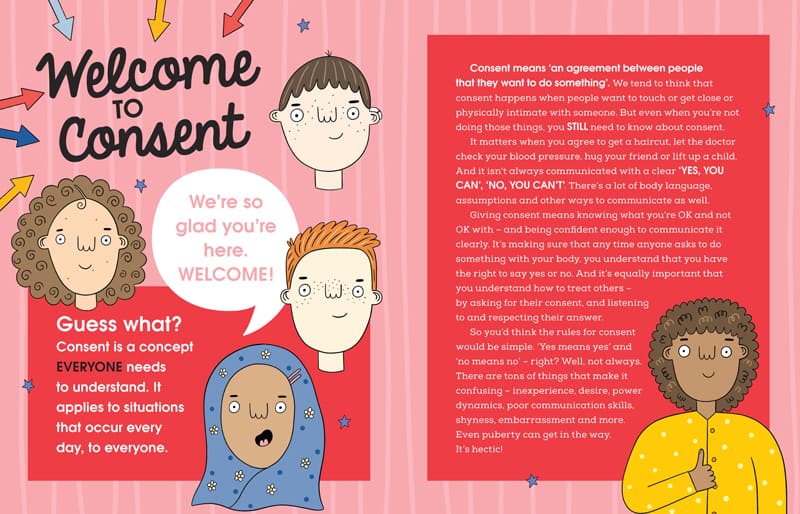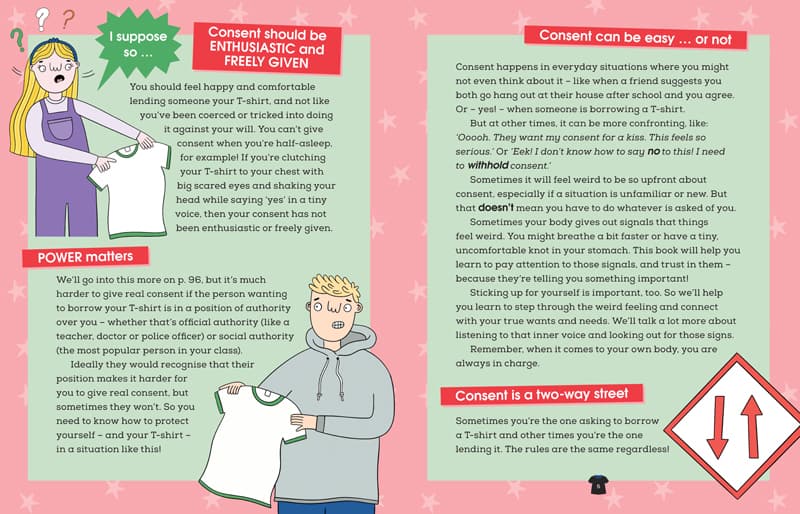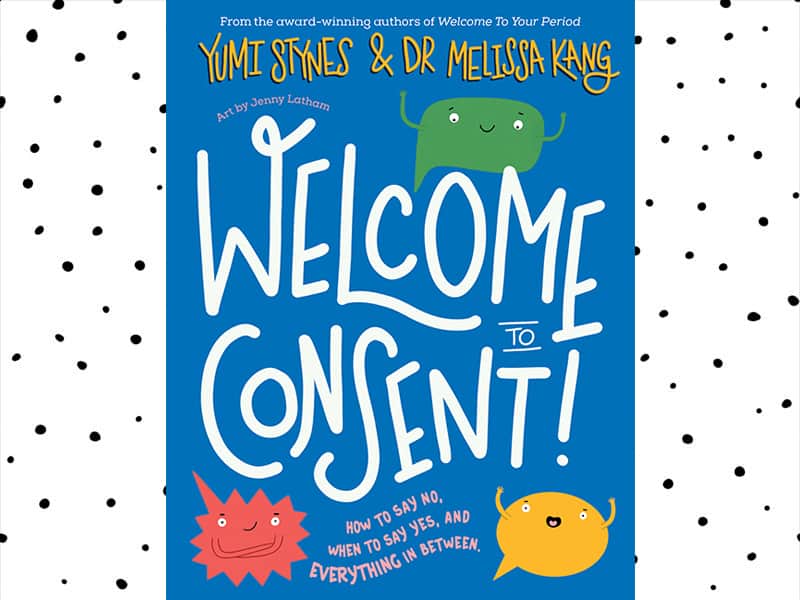Welcome to consent! Have you had the consent talk with your teen yet? It’s very, very important that you do: click here to find out all the reasons why. To further help you along, Yumi Stynes and Dr Melissa Kang (of Welcome to Your Period fame) have just released Welcome to Consent. It’s a very timely book to help you open the consent conversation with your kids.
“ snackable quality that kids really like – they pick it up and read it like they’re magnetically attracted!” co-author Yumi Stynes jokes. “We would love to see parents talking about consent with their kids – on a regular basis. You can start with questions like, ‘Does consent ever come up with you and your friends?’ ‘Would you know how to say no if someone was trying to force you to do something?'”

‘Welcome to Consent’ is the second book by Yumi Stynes and Dr Melissa Kang. Image: Supplied.
Grow with it
Welcome to Consent is subtitled ‘How to say no, when to say yes and everything in between’. It’s the ‘in between’ that Stynes and Kang excel at – they have managed to write in such a way that tweens will feel just as engaged and open as teens. I mean, it’s hard enough to talk to teens about consent, let alone younger kids. Note to self: do it anyway. With a little help from this excellent book.
“Parents keep in mind that a kid’s needs around consent will change as they grow,” advises Stynes. “A little kid might need to know about bodily autonomy. A 12-year-old may want to talk about kissing. And a 19-year old should be having conversations about how alcohol can make boundaries get really confusing.”
Like they did with the whole periods thing, the authors just have a knack for setting out big issues in simple language. Kang is an ex-Dolly Doctor, and Stynes is, well, Yumi Stynes, so they’ve really got a grip on what tweens and teens of any gender can relate to. The language is accessible without trying too hard to be woke (kids can sniff out a try-hard in a heartbeat, eg. use of the word woke). They’ve gone for a light-hearted approach to a very serious topic, but they manage to hit the tone just right.
Not just a sex thing
The topic of consent is a juggernaut and not to be taken lightly. While the tone is light and sometimes humorous, the content most definitely is not. Welcome to Consent will guide a conversation that goes beyond ‘no means no’ and instead discusses the intricacies of intimacy. That includes understanding that consent is not just a sex thing:

Image: Welcome to Consent.
Understanding personal boundaries – including your own. Why do you feel the way you feel and how can you best express that to others? How can you understand other people’s boundaries when they differ to your own?
Interpreting signals – because not everyone is confident enough to say ‘no’, so we need to be on the lookout for other signals and what they mean.
Speaking up and being firm – developing the confidence to guard your personal boundaries and give a firm no to anyone trying to cross them. This can be in any situation, not just sex.
Guarding your boundaries
A further issue around consent that kids need advice on is this:
Knowing what to do when someone isn’t respectful – how do you react when someone tries to push through your boundaries? What can you do and how can you develop the confidence to stand up for yourself?
“The best thing they can do is voice their objections,” says Stynes. “And it’s really good if they can do that in a situation where the stakes are low and they know they’re safe, so that when the stakes are higher, they have a few reps up at protecting their boundaries.”

Image: Welcome to Consent

Image: Welcome to Consent
Stynes gives the example of a best friend using a nickname that your kid doesn’t like. Your child tries to tell the friend that they don’t like the name, but the friend keeps it up. Stynes suggests that being firm about what may seem like small things is a a great way to practise consent by “really bedding in ways to say, “Could you please stop it? This sucks for me and I actually need you to respect that.'”
“It means that when you’re in an intimate situation, you know you can say no because you’ve had practise,” says Stynes. “And it can even be the same words! ‘This sucks for me and I actually need you to respect that!’ can apply to a number of situations!”
In fact, learning the many ways to say no and stand up for yourself is one of the things thoroughly discussed in Welcome to Consent. “One of the things we talk about in the book is the many ways to say No,” says Stynes. “Sometimes you might just need to walk away. Sometimes you might actually need to call ‘Stop!'”
Guarding your values
Of course, standing up for yourself is a learned skill and not one that comes easily to many people.
“A lot of us are conditioned to be ‘nice’ and not ’cause trouble’,” agrees Stynes. “It can be terrifying to use our voices. It can sometimes make it seem like the situation might escalate to something even worse if we stand up for ourselves.”
Many teens are reluctant to risk this escalation as they have a fear of drawing attention to themselves or becoming ’embarrassing’. They worry that it might be their fault they feel this way and will be judged by their peers for over-reacting or just for being different. If you find yourself in a situation like this, it’s critical that you put yourself first and try not to worry about how others will or won’t react. The important thing is to be true to yourself, your values and your current comfort level.

‘Welcome to Consent’ is the new book by Yumi Stynes and Dr Melissa Kang. Image: Supplied.
“Having a very clear understanding of what’s right and wrong is crucial,” advises Stynes. “This means we feel empowered to stand up for ourselves. In intimate situations where consent is up for discussion, often the ‘right’ and ‘wrong’ actually comes down to OUR FEELINGS. Do I want to do this? Is this a happy experience for me? Am I into it? And the beautiful thing about knowing that, and being in touch with your feelings, is that YOU KNOW IF IT’S RIGHT OR WRONG. You are completely the owner of your feelings – so if it doesn’t feel right, if it feels wrong, no one else can tell you otherwise.”
Conversation launch-pad
It’s not only the tough questions that Stynes and Kang address so well. The book is well set out and clear with cute illustrations that do some of the lifting of these heavy topics. The tone keeps things accessible for both tweens and teens. It reminds them that with a bit of knowledge and understanding, they can do hard things.
All in all, Welcome to Consent is a must-have in our tweenie-teen parenting arsenal. I suggest buying a copy and leaving it on your kid’s desk for a look-through. Then ask them later if they have any questions and begin back at the beginning to ensure they understand the importance of mutual, active, enthusiastic consent.
Thanks to Stynes and Kang for once again unravelling a delicate subject and giving parents a launch-pad to spring a decent conversation from.
Pre-order Welcome to Consent from Booktopia and get 25% off (signed copies currently available while stocks last).

